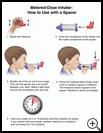
Metered-Dose Inhaler, How to Use with a Spacer
________________________________________________________________________
KEY POINTS
- A metered-dose inhaler is a hand-held device that releases a mist of medicine directly to your child’s lungs as your child takes a deep breath.
- A spacer is a special bag or plastic tube that is attached to the inhaler. The spacer holds medicine from the inhaler in the bag or tube and helps more medicine reach your child's lungs while your child breathes in and out slowly.
- If you are not sure how to use inhaler with a spacer, ask your healthcare provider or pharmacist for help.
________________________________________________________________________
What is a metered-dose inhaler with a spacer?
A metered-dose inhaler (MDI) is a hand-held device that releases a mist of medicine. Metered dose inhalers contain a gas that helps the medicine get into your child’s lungs. Inhalers help send the medicine directly to your child’s lungs as your child takes a deep breath.
A device called a spacer can be used with the inhaler. A spacer is a special bag or plastic tube that is attached to the inhaler. Spacers help when it is hard to press the inhaler at the same time that your child breathes in the medicine. The spacer holds medicine in the bag or tube and:
- Helps your child to breathe at your child’s own pace
- Helps more medicine to reach your child’s lungs
- Keeps medicine from just going into the air
Spacers can be used with or without a mask. Some spacers are made for just one type of inhaler.
How do I help my child use the inhaler with a spacer?
Before the first use, wash the spacer with warm soapy water. Rinse well. Allow to air dry.
To attach the inhaler to the spacer:
- Remove the caps from the spacer and metered-dose inhaler.
- Shake the inhaler well.
- If the inhaler has not been used before or if it has been more than two weeks since you last used it, you must then “prime” the inhaler. Do this by spraying 2 or 3 sprays of the medicine into the air. Each time you use the inhaler, the next dose is drawn into a chamber inside the inhaler. If the inhaler has not been used or sits for a long time without being used, some of the medicine leaks out of the holding area. This means your child will not get the full dose of medicine the next time it is used. Priming the inhaler makes sure that your child gets the full dose of the medicine.
- Insert the mouthpiece of the inhaler into the rubber-sealed end of the spacer.
- One spray is called a puff.
To use the inhaler with the spacer and mask:
- Select the correct size mask (small, medium, or large) and attach to the mouthpiece end.
- Have your child stand or sit up straight.
- Put the mask to your child's face, covering both the nose and mouth. The mask must be pressed to your child's face to assure that the medicine can get to the child's lungs.
- Press down on the inhaler once.
- Have your child breathe in and out slowly through the spacer for at least 5 breaths.
- If your provider prescribes additional puffs, wait 1 minute and repeat.
To use the inhaler with the spacer and mouthpiece:
- Have your child stand or sit up straight.
- Place the chamber into your child's mouth. Ask your child to breathe slowly in and out of the spacer several times.
- Press down on the inhaler once to release a spray of medicine. The medicine will be trapped in the spacer.
- Have your child breathe in as deeply as possible and then hold his or her breath and count slowly to 10. This gives the medicine time to reach your child’s lower airways. For children unable to hold their breath, another method is to breathe in and out slowly for 3 to 5 breaths.
- If your provider prescribes additional puffs, wait 1 minute and repeat.
- If possible, have your child brush teeth and rinse his or her mouth with clear water after taking this medicine. The water your child rinses with should be spit out.
How do I clean the inhaler and spacer?
- Wash the plastic case for the inhaler once a week with soapy tap water. Rinse well. Allow to air dry.
- Wash the spacer once a week with soapy tap water. Rinse well. Allow to air dry.
- Replace the one-way valve or get a new spacer when the valve dries out and starts to curl.
Last modified: 2021-07-27
Last reviewed: 2021-06-15

